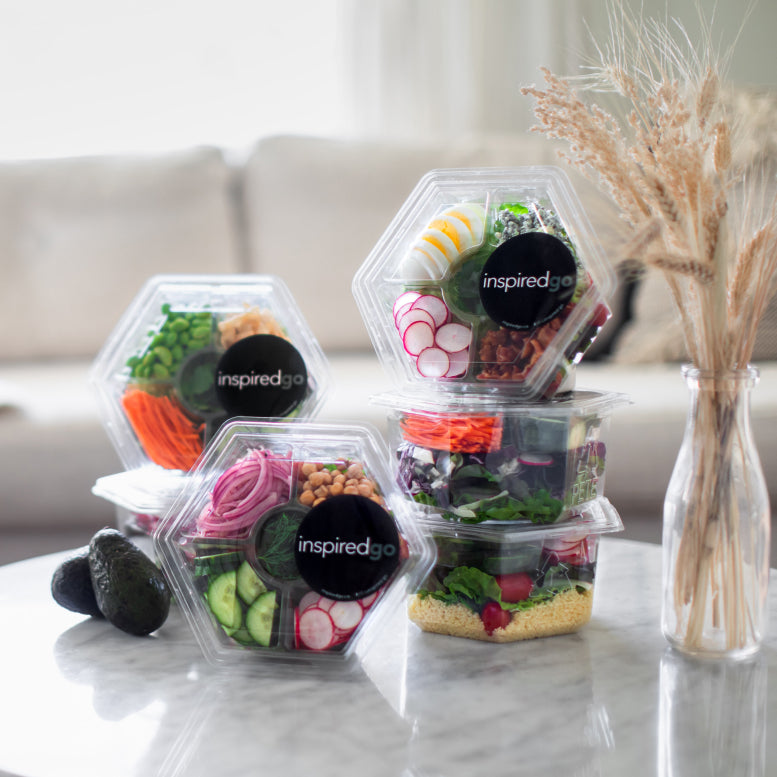Can Vegan Salads Have Enough Protein?
Table of Contents
1. The Protein Power of Vegan Salads
2. Are Vegan Salads Filling Enough for a Complete Meal?
3. Do Vegan Salads Provide Enough Energy for Busy Days?
4. What Sets Inspired Go’s Vegan Salads Apart from Other Options?
1. The Protein Power of Vegan Salads
When most people think of protein-rich foods, they often picture animal-based products. However, many plant-based foods are also excellent sources of protein. Vegan salads, for example, can be packed with protein, and they offer an array of other essential nutrients. The key is to choose the right ingredients. Legumes such as chickpeas, lentils, and black beans are all high in protein, as are quinoa, tofu, tempeh, and edamame. Even vegetables like broccoli, spinach, and peas contain a decent amount of protein. Additionally, seeds like chia, hemp, and flax, as well as nuts like almonds and peanuts, can significantly boost the protein content of vegan salads. Therefore, with a bit of careful planning and creativity, vegan salads can indeed help meet your protein needs while also contributing to a balanced and nutritious diet.
Order fresh salads today →


2. Are Vegan Salads Filling Enough for a Complete Meal?
A common misconception is that vegan salads leave you hungry, but when designed thoughtfully, they can be as hearty and satisfying as any traditional meal. A well-structured vegan salad balances fiber-rich vegetables with plant-based proteins like chickpeas, tofu, or lentils, along with healthy fats from seeds, nuts, or olive oil-based dressings. These components work together to deliver sustained energy, reduce cravings, and keep you feeling full for hours without unnecessary heaviness. Whole grains or legumes included in some recipes add complex carbohydrates that further enhance satiety and provide a steady source of fuel throughout the day. The combination of fiber, protein, and healthy fats also helps stabilize blood sugar levels, preventing energy crashes. Choosing salads with nutrient-dense ingredients ensures you meet your calorie needs while supporting optimal digestion and overall vitality.
Choose your salads and schedule delivery →
3. Do Vegan Salads Provide Enough Energy for Busy Days?
Vegan salads, when built with a balanced mix of macronutrients, can offer steady, long-lasting energy to fuel even the most demanding schedules. Fresh vegetables deliver essential vitamins and minerals, while complex carbs from whole grains or legumes release energy gradually, avoiding the highs and crashes caused by refined carbs. Plant-based proteins like lentils, tofu, or beans support physical stamina and muscle recovery, making them ideal for active lifestyles. Healthy fats from avocado or olive oil aid in brain function, improving focus and concentration throughout the day. Adding nuts, seeds, or even roasted chickpeas to your salad can enhance satiety and help maintain energy levels without relying on heavy, processed foods. With thoughtful ingredient combinations, vegan salads provide the fuel you need to stay sharp and energized for hours.
Get fresh salads and snacks delivered →
4. What Sets Inspired Go’s Vegan Salads Apart from Other Options?
Not all vegan salads are created equal, and Inspired Go takes plant-based meals to the next level with thoughtfully designed recipes and premium sourcing. We prioritize local, seasonal produce to maximize both flavor and nutrient density, pairing it with plant-based proteins, complex carbs, and healthy fats for truly balanced meals. Our salads are portion-controlled to help you stay on track with your nutrition goals, and every option is clearly labeled for transparency and peace of mind. Unlike quick-serve or store-bought salads that can feel repetitive or lacking in substance, Inspired Go’s dishes are chef-crafted for taste, texture, and long-lasting satisfaction. Each delivery brings you fresh, convenient meals that make vegan eating something you crave, not compromise on, giving you variety, flavor, and nutrition you can rely on day after day.
Try our fresh, ready-to-eat salads →
Frequently Asked Questions
The most nutritious salad greens are dark leafy varieties like spinach, kale, and arugula. These greens are packed with essential vitamins, including A, C, and K, as well as minerals like calcium and iron. Kale is particularly rich in antioxidants, while spinach offers significant amounts of folate and magnesium. Choosing a mix of dark greens enhances both the flavor and nutritional value of your salad.
A healthy salad includes a balance of nutrient-dense ingredients like leafy greens, fresh vegetables, lean proteins, and healthy fats. For example, a base of spinach and kale, paired with grilled chicken, cherry tomatoes, avocado, and a light olive oil dressing, creates a wholesome meal. Avoid fried toppings or sugary dressings, as they add empty calories, and opt for natural ingredients to maximize nutrition.
Yes, eating salad daily is a healthy habit when it includes a variety of fresh, nutrient-rich ingredients. Salads offer fiber for digestion, antioxidants for immunity, and essential nutrients like potassium and folate. Regularly eating salads can support weight management and improve energy levels. To avoid monotony, vary your greens, proteins, and toppings to keep meals satisfying and nutritionally balanced.
Healthy salad dressings are typically made with simple, natural ingredients. Olive oil-based dressings, paired with balsamic vinegar or fresh lemon juice, provide healthy fats and enhance flavor without unnecessary calories. Avoid store-bought dressings with high sugar or preservatives. For a creamy alternative, opt for homemade dressings using Greek yogurt or avocado for added nutritional benefits.
Yes, salads are incredibly beneficial for overall health when prepared with fresh, whole ingredients. They are low in calories and high in vitamins, minerals, and antioxidants, supporting heart health, digestion, and immunity. Adding a mix of proteins and healthy fats creates a satisfying, nutrient-dense meal. Regularly incorporating salads into your diet can promote long-term well-being and energy.

